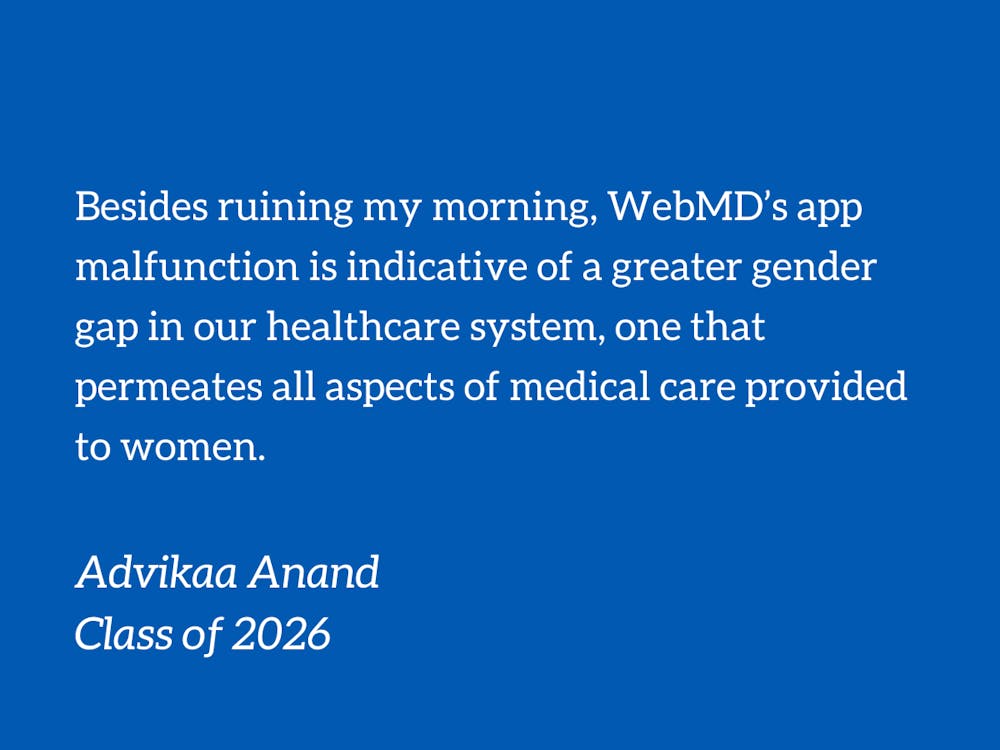I had a rough day today. My back was hurting, my head was heavy, and my vision grew blurry. With classes from 8:30 to 3:00, I had no time to consult student health, so I resorted to the WebMD symptom checker instead. After all, with such an easily accessible resource, why would I undertake the additional burden of having to visit the doctor?
But as soon as I entered my gender into the app, WebMD had a single diagnosis to give me: pregnancy! Obviously, as a woman who had experienced menarche, the only possible explanation for my ailments was a condition relating to hormonal havoc. There was no way that I could be suffering from a legitimate illness, and if I was in too much distress, “meditation” techniques could come to the rescue.
Besides ruining my morning, WebMD’s app malfunction is indicative of a greater gender gap in our healthcare system, one that permeates all aspects of medical care provided to women.
A notorious instance of such bias is the consistent tendency of doctors to overmedicate women, leaving them prey to deadly side effects that can damage their vital organs. Their medical training fails to teach them that the medical trials conducted for the most common drugs, including aspirin, morphine, and heparin, were only performed on men before gaining approval for consumption by the general public. This faulty recommendation does not account for the vast physiological differences between men and women — divergences that cause women to metabolize these drugs at a much slower rate than men, “leading to higher levels of exposure to the drug . . [which results] in significantly higher rates of adverse side effects in women.”
These medical missteps are not limited only to obscure health conditions on which available research is scant. On the contrary, they manifest in doctors’ attribution of serious medical symptoms experienced by women to hormonal fluctuations, hysterical tendencies and women being told their symptoms are not worthy of care. As Dr. McNally from the Katz Women’s Health articulates, “There’s still this pervasive belief in the medical community that anytime a woman complains about her health, it’s either related to her hormones or all in her head.”
As teenagers, this harmful mentality can compel us to neglect important warning signs in our health, dismissing migraines as psychosomatic symptoms and other manifestations of chronic pain. A classic example of this tendency is doctors’ dismissal of warning signs of serious medical conditions, such as ovarian cysts, endometriosis, and cancers, as occurring merely because “it’s that time of the month” — despite the fact that “endometriosis affects one in 10 women, which means its as common as diabetes in women.” How then, as young women inching towards the cusp of adulthood , can we be expected to take proper care of our health when the entire medical field belittles the signs that our bodies are not working optimally.
Global disasters, such as the pandemic, can exacerbate these disparities. With COVID-19 demanding a greater quantity of frontline workers, “coverage of key health interventions for women...dropped up to 25%.” This startling statistic has been a primary agent in limiting women’s ability to seek healthcare.
The shocking threat that these inequalities present to a woman’s livelihood has produced a critical demand for companies that prioritize a woman’s wellbeing.
Recently, I was searching for a healthcare app that would help me to navigate my persistent backache without incurring the added duress of visiting a doctor. I was led to the Caraway app, where through scheduling a telemedicine appointment, connection to in person care by assistance with care referrals, coordination, and follow up, I was able to find doctors’ who clarified that my pain’s occurrence on the heels of my menstrual cycle was normal without dismissing how it was acting as a deterrent to my daily life. This interaction made me feel safe amidst other medical encounters that have made me feel as though the importance of female-centric care has been neglected.
What I found particularly interesting about Caraway is its offering of care designed around women and those AFAB, and personalized for all. The company is aimed specifically at college women, endeavoring to alleviate the stress that accompanies navigating the intricacies of the healthcare system for the first time, including managing insurance and medical procedure side effects.
Such companies that empower us to make informed choices about our health must continue to prioritize disseminating healthcare information in a way that is accessible and affordable; as young women, we are entitled to this knowledge because our bodies do not merely deserve to survive; they are meant to thrive.
Advikaa Anand is a Trinity freshman. Her columns typically run on alternate Thursdays.
Get The Chronicle straight to your inbox
Signup for our weekly newsletter. Cancel at any time.
Advikaa Anand is a Trinity sophomore and an opinion managing editor of The Chronicle's 119th volume.

